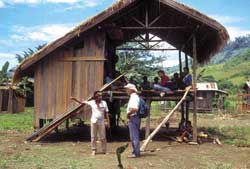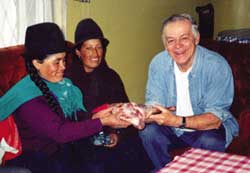Expect the unexpected
After 41 years, the life of a missionary priest continues to be a walk in faith into the unknown
By Fr. Charles Gervais, S.F.M.
January 2004
Return to Table of Contents
Print Article
When I first set out in mission as a young priest 41 years ago, I did not know what was in store for me. With much excitement, Fr. Longie MacLean and I boarded the boat from San Francisco to the Philippines in the fall of 1962. We were going to "The Pearl of the Orient". We would learn a new language and get to know a new people. Our faith was strong, but on this 17-day boat trip we began to learn firsthand how important it is to have faith in a loving God.

Fr. Charles Gervais passes through a Manobo village in the hills of Mindanao, Philippines.
There were only 11 passengers on board: four retired couples, a widower, and Fr. Longie and I. Needless to say, we all got to know each other very well during the trip.
The evening before the ship landed in Manila, the other passengers had a farewell party for us. During the party I saw Elaine, one of the passengers, sitting by herself with tears in her eyes.
I sat beside her and asked why she was crying. She said, "I feel so bad for you and Longie. You are going into the mountains of the Philippines and you do not know what to expect and what the people will be like."
I assured her that we were looking forward to our mission work and were excited about it. But I sensed that there was more to her tears. "Come on," I said, "Tell me the real reason why you are crying."
She answered, "It is so terrible to grow old."
She was about 75 years of age – in her twilight years. She adhered to no religious belief and was not a person of faith. She and her husband were extremely wealthy. This was their third trip around the world. During her life she had had everything, but now she felt she had no purpose; that she had nothing to look forward to in her remaining years.
This memory came flooding back to me seven years later while working in Southern Leyte, Philippines. I was called to visit a sick man and the people led me outside of town to a bamboo shack in a coconut grove.

Receiving a cut of meat from women in the community who raise sheep.
Eighty-year-old Felix was dying. He lay on a hard wooden bed and his wife Dolores sat beside him, holding his hand.
I gave Felix the Sacrament of the Sick and gave them both Holy Communion. When I had finished, Felix began to speak of his wife. "Poor Dolores," he said. "She has to feed me, clean me, feed the animals, and do all the work around the house. I cannot help her at all."
Then Dolores in a trembling voice said, "Poor Felix, he is in so much pain." She told me about his many ailments and suffering. She was still holding his hand and they were looking at each other. One could see the love in their eyes for one another.
A few days later Felix died. They brought his body down from the mountains into town in a coffin. Two people helped Dolores to make the journey walking behind the coffin. After the funeral, we went to the cemetery just outside of town. While they lowered the coffin, Dolores stood at the edge of the grave with tears in her eyes. She said in a trembling voice, "Goodbye Felix, I am going to miss you. But don't worry, I will be with you again soon."
On my way home that day, my mind went back to Elaine and her husband whom I had met on the boat when I first set out on mission. They seemingly had everything, but in reality they had nothing. They had no faith.
Felix and Dolores had almost nothing, yet because of their deep faith they had everything.
Throughout my years in the Philippines, little did I know that I would be called upon to support and be with the people during the dark and abusive days of the Marcos dictatorship. I will never forget the joy of celebrating with them when they finally expelled the dictator in a nonviolent demonstration in the streets of Manila. I was there when millions of Filipinos stopped military tanks with their bodies, rosaries, prayers and flowers.
I never expected to be part of nonviolent demonstrations with the people of San Fernando, Bukidnon, when they picketed to stop two logging companies from clearcutting the trees in their watershed in the mountains. It was the first time that 'people power' stopped logging in the Philippines.
In 1992 I came home after 30 years in the Philippines. I took a mini-sabbatical to try to discern God's plan for me at this new stage in my missionary life. I did not know that I would spend the next nine years on the road in Canada promoting Scarboro Missions. I saw more of Canada than I had ever seen before and met so many wonderful Canadians. But the call of overseas mission was still strong and my eyes looked south, to our mission in Ecuador.
I did not expect that God would give me the grace and the courage to go to a new mission and learn a new language in my senior years. I arrived in Ecuador in September 2001 at the age of 66 and took on the challenge of learning Spanish.
Scarboro Missions has its mission in the diocese of Riobamba in the province of Chimborazo, the poorest province in the country. About 70 percent of the population are indigenous-a people who have suffered centuries of conquest and oppression.
Since I've been here, I have worked with the people in their efforts to better their lives. I have seen one community come together to build a much-needed primary school. In another community, the people worked together to build a centre for the women to meet and to do weaving as a means of income.
I feel blessed to walk with the indigenous people of Riobamba on their spiritual journey through this life, and to accompany them on their journey to liberation.
After 41 years, my life as a missionary priest continues to be a walk in faith into the unknown. I do not know what God has in store for me in the future, or how I will be called to witness the love of Christ to the people I serve. All I know is that I have to be ready for the unexpected.
Return to Table of Contents
Print Article